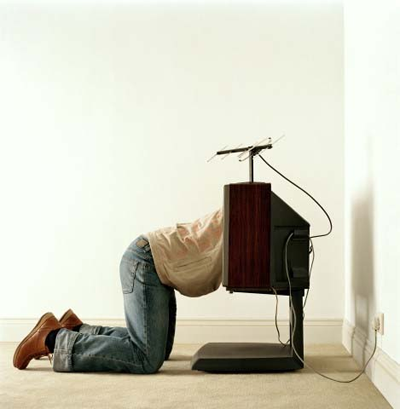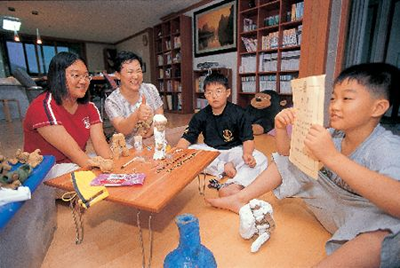
Hankyoreh newspaper reported that "one of the reasons for kids' late development is TV." (April. 5. 2005) Parents hope children will utter earlier, so they get help from TV, but TV entails heavy losses. As time goes on, problems happen little by little.
People may be under control unconsciously from TV. They aimlessly believe information in the media, whether it is true or not. And the more serious problem is that they imitate them carelessly. While we walk on the street these days, we can not distinguish people from each other, because of similar fashion and features. If an entertainer creates a new fashion, it becomes a national fashion, not a personal fashion. For example, there are pants for X's style or a necklace a hero wore in a drama on the market or on the internet. Individual character may disappear in this reality. Even if someone has a personal style, in fact, it is a common fashion which is already made by other people, not an individual p대ple. Also, we can find a unified society in culture. We can see "People For Seeking Laugh" viewing in new meetings as well as on TV. Some theatrical company in Daehak-street attracts public gaze by copying characters appearing in this program with the object of profit, as someone imitates for pleasure when gathering together.
The main TV programs are broadcasted in the morning or at night. People can't watch TV in the morning because they are busy in daily life; therefore they watch in the evening or at night. It was usual that family members had dinner, gathering together in the evening and had some time to mediate before sleep. However, after getting a TV, they concentrate on TV, when they have a meal or after it. Therefore, the time to talk between parents and children grows smaller, and they don’t talk with advance concern. As a result, the children’s education at home is not practiced by parents.
TV creates a one-way communication, and most of the mass media outlets, are like it. Namely, the time for feedback diminishes by accepting it unconditionally without affording to think by oneself. This means that someone has trouble to exchange ideas with people, as intercepting from a feeling, and even to do something that one likes. Also, thinking power and searching power declined by absorbing the information that TV gives without thinking.
There are a lot of programs dealing with an image that is widely apart from real life. In particular, in the case of dramas, we can see that the rich marries the poor, a poor person becomes a rich man, one virtuous person fights against a vicious person and finally gains a victory. We can't say firmly that it is impossible in reality, because it may be possible. But, it is extremely rare. People are addicted to this new world, seeing these scenes. They are apart from the actual, as they spread their fancy, desiring these chances. Then they get useless damage, they cannot marry, remain poor, get hurt heavily, even pass away, and so on. Also, only handsome, rich and beautiful people appear in most films. Teenagers and children dream by seeing this.
There is a proverb saying,"Time is money". It would be hard to recognize its meaning for the youth. Most of them don't spend time thinking about the importance of time. But it is inevitable fact to know in anyone's life. Some people come home in a hurry to obey the black box in the living room. How much should the TV weigh in one's life? It is a precious time even to develop his or her ability. Without any preparation, one might despair and spend time in front of the TV. Consequently, one's life would end up being a couch potato with despair.

In America, the 'TV-Turn off campaign' has been follwed very actively. 'The 'TV-Turn off campaign' started in the church and the schools were become the citizen campaign, because the harm of TV is announced to the citizen through speech and institutions. Then on profit institutions, 'TV-Turnoff Network' have been playing the campaign that 'doesn't turn on TV for one week of TV turnoff'.
It means that we have to enjoy a new life - a stroll, travel, reading and hiking with family or friends-, getting out of life buried under the TV, instead of watching the TV for a week. About 7 million 600 thousand people in 9 thousand groups (schools, libraries, churches etc) all over the country, took part in the 10th event, which was held under the title 'Turn off TV - Turn on Life!' last April 19th to 25th.
A spokesman, Jennifer, in TV-Turn off Network explains the purpose of this campaign; "Children in America spend more that 1000 hours a year (an average of 3 hours a day) in front of the TV. If we give consideration to watch even video games, DVDs and movies, the time binding to the TV will be expanded by far. As teenagers who lounge at TV grow up, they will be annoyed by serious illnesses such as heart disease and diabetes."
Germany doesn't allow the sponsor participation of firms in children's programs and Sweden forbids to advertise as to fast-food during children's programs by law. Australia has led to watch, as settling a fixed time zone on broadcasting stations. They divide programs into C (for children entering school) and P (for preschool children). Moreover, advertisement is banned on the time zone, which is televised P programs.

In fact, we cannot imagine the world without TV, but why don't you get away from your TV ?
By Ko Hyun-sun
Culture Reporter
HERALD
webmaster@herald.cau.ac.kr

